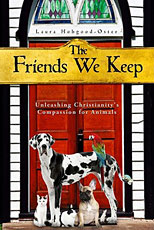Laura Hobgood-Oster is Professor of Religion and Environmental Studies and holds the Paden Chair in Religion at Southwestern University. She is the author of Holy Dogs and Asses: Animals in the Christian Tradition and executive editor of the Encyclopedia of Religion and Nature. Hobgood-Oster correctly states that Christianity has not taken seriously the role of God's creatures in the daily lives of the faithful. Individual believers have extended respect, love, and compassion toward animals, but the church at large has underplayed and even completely ignored them. In this passionately presented wake-up call, the author makes a good case for "unleashing Christianity's compassion for animals."
Hobgood-Oster, a dog rescue volunteer in Georgetown, Texas, happily salutes those Christian saints who made a special place in their hearts and communities for companion animals. Here is a delightful story of one of them:
"At the feet of St. Martin were a dog and a cat eating peacefully from the same bowl of soup. The friar was about to call the rest of the monks in to witness this marvelous sight when a mouse stuck its head out from a little hole in the wall. St. Martin without hesitation addressed the mouse as if he were an old friend. 'Don't be afraid, little one. If you're hungry come and eat with the others.' The little mouse hesitated but then scampered to the bowl of soup. The friar could not speak. At the feet of the servant St. Martin, a dog, a cat, and a mouse were eating from the same bowl of soup."
We are a long way from the hospitality toward animals demonstrated in this story. The best estimates, according to the author, are that six to eight million dogs and cats enter facilities each year in the U.S.; approximately half of these are euthanized. Many more suffer abuse from the human beings who should be their caregivers. Others are treated as commodities in "puppy mills" or used as gladiators in dog fighting matches. Another sorry situation is the death of five thousand racehorses between 2003 and 2008 in the U.S. Hobgood-Oster speaks out against sport hunting where animals are killed, not for human survival or food, but for entertainment or trophies. Some theologians and groups have protested all of these examples of cruelty to animals, but it is time for a more concerted effort by all denominations within Christianity.
Eating meals in community is a major spiritual practice for those on the Christian path. Hobgood-Oster shares ideas about how churches can protest against factory farms where chickens, pigs, and cows die terrible deaths after living painful and stressed lives. She concludes: "As people of faith, Christians are called to take on the responsibility of raising awareness and shedding light on the dark sheds that hide the suffering of animals from view."
Other subjects covered by Hobgood-Oster include the extinction of many species at our hands through pollution, climate change, and habitat destruction; the continuing use of small mammals for research (estimates run from twenty to twenty-five million per year) and the persistence of the idea that the role of human beings with animals is one of domination and control. Hobgood-Oster makes a good case for extending reverence, hospitality, and compassion to animals, our dear and treasured fellow-travelers on the good Earth.
